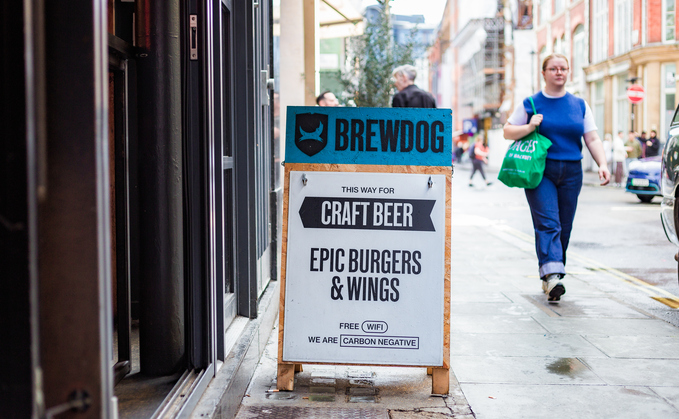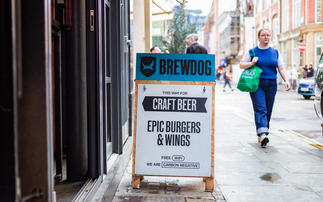
Sign outside a Brewdog pub on a city street in central London | Credit: iStock
Brewing giant claims voluntary carbon market has been flooded with poor quality schemes that have meant the price of credits from credible projects have shot up to 'astronomical' levels
Brewdog has announced it is no longer buying carbon offsets, claiming the global market has become "unsustainable" due to an overabundance of poor quality schemes and a sharp increase in the price of credits from credible, verified projects.
The craft brewing giant said the past few years had seen "a flood of low quality schemes that are dirt cheap but where the carbon benefit is highly questionable, and maybe even non-existent".
It complained that at the same time the number of higher quality carbon credit schemes available to invest in through the global voluntary carbon market (VCM) had dwindled, while demand from corporates keen to support effective projects had soared. The company said that as a result the cost of credits issued by high integrity projects "have gone through the roof".
"In fact, the cost is so astronomical that the only way for Brewdog to sustain a 'carbon negative' claim is at the expense of our own sustainability initiatives," the Scottish firm said this week. "That would be crazy. It would be like cutting out fruit and veg so you can afford to buy vitamin supplements! We absolutely will not invest in low quality schemes. We absolutely will not press pause on our efforts to reduce emissions."
As a result, Brewdog said it would soon be ditching all 'carbon negative' claims across its marketing, and would instead concentrating on its own internal tree planting and decarbonisation efforts to tackle its emissions going forward.
"Some people will be disappointed that we'll be relinquishing our 'carbon negative' claim, but the use of funds we'd otherwise spend on carbon offsets is better invested in facilitating the decarbonisation of our process," the company said.
The announcement came in the company's interim sustainability report update published on Tuesday, in a dedicated section entitled "why we're no longer outsourcing our carbon responsibilities".
The Scottish firm has long promoted both its operations and beers as 'carbon negative' and 'planet positive', labels that have featured prominently in its marketing material and on its beer cans, which are widely available in supermarkets and at the hundreds of bars it runs worldwide.
That claim has been largely based on the firm's investment in carbon credits to cancel out more emissions than it generates itself, allowing it to justify its assertion that it is a 'carbon negative' company.
Last year, however, the Advertising Standards Authority (ASA) upheld two complaints against the brewer over adverts which claimed its beers were 'carbon negative' - a decision Brewdog's co-founder James Watt slammed at the time as "spurious".
At the same time, Brewdog has attracted headlines for its 'Lost Forest' project, which has seen its buy up around 50 square kilometres of land in the Scottish Highlands, where it is aiming to plant millions of trees and restore peatlands in order to counteract its own emissions.
But this week firm said that after consulting with its scientific adviser - world-renowned carbon footprinting expert Mike Berners-Lee - it had decided "to step away from buying carbon credits and double down on our emissions reduction strategy and investment in the Lost Forest".
"This way, we can be certain about what we're investing in, and what the carbon benefit is," it said.
Brewdog insisted it was still "proud to be the first carbon negative beer company", a status it said it had achieved through a "relentless focus on reducing emissions in every part of our business, and then offsetting the rest by purchasing high quality carbon credits".
However, it said it now planned to "wind down" use of the claim across its products, bars, and communications "over the next few months".
"A lot of businesses are moving away from 'carbon negative' and 'carbon neutral' for the same reason, and we won't be able to claim this after November as Positive Planet will no longer offer this accreditation," the firm said.
Elsewhere, the report also provides an update on its Lost Forest tree planting project, which has faced significant challenges that reportedly saw around half of the saplings it planted at the estate perish last summer.
Brewdog said it planted almost 439,000 trees in partnership with Scottish Woodlands at the estate last year, before it was forced to contend with "the fifth hottest Scottish summer on record".
"With woodland projects of this scale, you know that some saplings won't survive, and you plan for it from the outset," the report explains. "But last summer's extreme conditions resulted in a higher-than-expected failure rate, particularly Scots Pine, which is one of eleven species we planted.
"It's disappointing, but over the past few months we have been assessing how many of our saplings made it, and we're working on a plan with Scottish Woodlands to replace those that didn't flourish. Standing up to climate change is a daunting task, and it's easy to disengage or decide to leave it to others. But if everyone did that, there'd be no hope for humanity. So, we will stay the course, and we won't let setbacks dishearten us."
BusinessGreen has contacted Brewdog for further comment.
The company is far from the only firm to step away from the VCM and 'carbon neutral' claims in recent years due to concerns over the poor quality of some of the credits available on the market, and the heightened risk of being accused of corporate ‘greenwashing'. For example, Nestle last year stopped using 'carbon neutral' claims across its brands.
The VCM has responded with a number of initiatives, such as the Voluntary Carbon Markets Integrity Initiative (VCMII) and the Integrity Council for the Voluntary Carbon Market (ICVCM), which are trying to improve standards and bolster trust in the market.
Last year, the VCMII developed a new code of practice providing guidance on how firms should use carbon credits as part of their corporate climate strategies, in which it recommended that firms should ditch claims such as 'carbon neutral' and adopt a "climate contribution" model instead.
Commenting on Brewdog's announcements, Lorna Ritche, director of public affairs at the ICVCM, reiterated that companies should "always prioritise rapid cuts in their own emissions before using high integrity CCP [Carbon Core Principles] labelled carbon credits for emissions that are unavoidable".
"ICVCM's mission is to increase the integrity of carbon credits in the market through setting and assuring standards to scale global finance going to climate reductions and removals projects," she said. "In response to these reforms we expect a shift in the market and an increased supply of high integrity carbon credits available over time."
Want to understand what is going on at the cutting edge of sustainability? Check out BusinessGreen Intelligence - the premier information for professionals focused on the UK's green economy.














